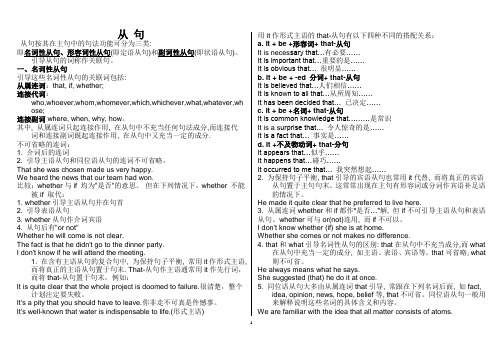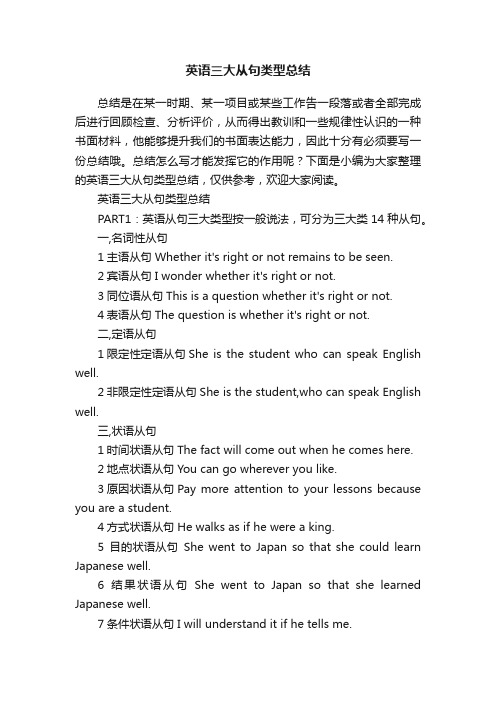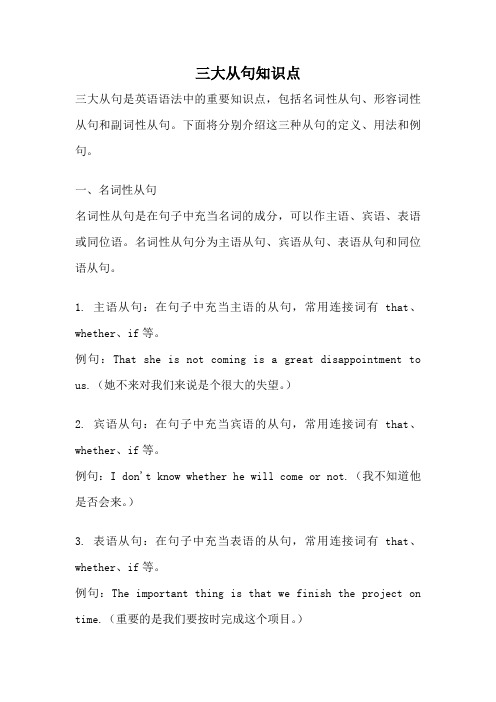三大从句
英语三大从句

英语三大从句在英语中,主要有三大从句,即名词性从句(包括主语从句,宾语从句,表语从句,同位语从句)、形容词性从句(即定语从句)、副词性从句(即状语从句,包括时间、条件、结果、目得、原因、让步、地点、方式等)。
定语从句一、关系代词引导得定语从句关系代词代替前面得先行词,并且在定语从句中充当句子成分,可以作主语、宾语、定语等。
常见得关系代词有:who, that, which。
它们得主格、宾格与所有格如下表所示:(一)关系代词who, whom与 whose得用法who代替人,就是主格,在定语从句中作主语。
An architect is a person who designs buildings、建筑师就是设计房屋得人。
whom代替人,就是宾格,在定语从句作宾语,在非正式英语常可省略。
Do you know the gentleman whom we met in the school library yesterday? 昨天我们在学校图书馆里遇到得那位先生您认识吗?whose一般代替人,有时亦可代替物,就是所有格,在定语从句作定语。
The girl student whose father is a senior engineer used to study abroad、其父就是一位高级工程师得那个女学生过去在国外留学。
Do you know the name of the hotel whose window we can see here? 我们这儿能瞧到窗户得那个宾馆叫什么名字,您知道吗?(关系代词whose指代先行词hotel,正式用法应该用of which。
whose window=the window of which,意思就是:the window of the hotel。
)(二)关系代词which得用法which代替物,在定语从句作主语或宾语,作宾语时还可省略。
I do not like stories which have unhappy endings、我不喜欢有不幸结局得小说。
三大从句

从句从句按其在主句中的句法功能可分为三类:即名词性从句、形容词性从句(即定语从句)和副词性从句(即状语从句)。
引导从句的词称作关联句。
一、名词性从句引导这些名词性从句的关联词包括:从属连词:that, if, whether;连接代词:who,whoever,whom,whomever,which,whichever,what,whatever,wh ose;连接副词where, when, why, how。
其中, 从属连词只起连接作用, 在从句中不充当任何句法成分,而连接代词和连接副词既起连接作用, 在从句中又充当一定的成分.不可省略的连词:1. 介词后的连词2. 引导主语从句和同位语从句的连词不可省略。
That she was chosen made us very happy.We heard the news that our team had won.比较:whether与if 均为"是否"的意思。
但在下列情况下,whether 不能被if 取代:1. whether引导主语从句并在句首2. 引导表语从句3. whether从句作介词宾语4. 从句后有"or not"Whether he will come is not clear.The fact is that he didn't go to the dinner party.I don't know if he will attend the meeting.1. 在含有主语从句的复合句中, 为保持句子平衡, 常用it作形式主语,而将真正的主语从句置于句末. That-从句作主语通常用it作先行词,而将that-从句置于句末,例如:It is quite clear that the whole project is doomed to failure.很清楚,整个计划注定要失败。
初中英语语法三大从句总结,仅此一份,建议收藏!

在初中英语中,主要有三大从句,即宾语从句、定语从句、状语从句(包括时间、条件、结果、目的、原因、让步、地点、方式等)。
小编今天跟大家分享的就是这三个从句的主要语法点,赶快看起来吧!宾语从句一、定义在句子中起宾语作用的从句叫做宾语从句。
二、连接词that: I think that you can pass the exam.Whether/if: I don’t know what the word means.“Wh”: I don’t know what the word means.I don’t know where he found the book.只用whether的情况:1. 与or not连用:I don’t know whether it’s raining or not.2. 与动词不定式连用:He doesn’t know whether to accept the invitation.3. 连接词前有介词时:It depends on whether he is coming.三、时态1. 主句是一般现在时态,从句根据实际情况而定(各种时态均可)She wants to know what he has done for the exam.2.主句是一般过去时态,从句用相应的过去的时态。
1)She said that she was a student.2)She said that she would fly to Japan in a week.3)She said that she had finished her homework already.3. 如果宾语从句说的是客观真理、自然现象或事实时,这时宾语从句要用一般现在时态。
The teacher said that the earth goes round the sun.一、定义在复合句中修饰名词、代词的从句叫定语从句。
三大从句

1. 前置
• There is only a remote possibility that many other elements will be found. • 再发现许多新元素的可能性是不大的。
2. 后置
• Foreigners sometimes draw the conclusion that Americans are wealthier than they are. • 外国人有时会得出这样的结论:美国人比 他们富有。
3. 转为动词
• Even though wealth has grown greatly in the United States,there is much concern that its distribution has become increasingly uneven. • 虽然美国的财富大大增长,但是有许多 人担心美国的财富分配已变得越来越不 均衡
2. 同位语 前置定语
• But to Robert Hecht, an enterprising American antiquities dealer living in Paris • 住在巴黎的经营有方的美国古董商罗伯 特·海克特
同位语从句
• 1. 前置法:…的 • 2. 后置法:即;那就是: • 3. 转为动词 (名词有动作含义,转为动词, 直接接从句)
2007.3第二段的第二句
• Evidence is increasing that more and more artifacts are being illegally unearthed from their countries of origin. • 日益增多的证据表明,越来越多的文物正 在其所在国被非法挖掘。
高中三大从句

高中三大从句高中三大从句是高中语文学习中非常重要的知识点,包括定语从句、状语从句和主语从句。
下面我们来逐个介绍这三大从句。
一、定语从句定语从句是在复合句中作定语的从句,用来修饰一个名词或代词。
它通常由关系代词或关系副词引导,关系代词有:that、which、who、whom、whose等;关系副词有:when、where、why等。
1. 关系代词引导的定语从句例句1:我喜欢那个写信的女孩。
解析:定语从句中的关系代词是that,引导一个修饰女孩的定语从句。
2. 关系副词引导的定语从句例句2:我喜欢在阳光明媚的日子里散步。
解析:定语从句中的关系副词是when,引导一个修饰日子的定语从句。
二、状语从句状语从句是在复合句中充当状语的从句,用来修饰或说明主句的动作、情况或条件。
常见的有时间状语从句、地点状语从句、原因状语从句、条件状语从句等。
3. 时间状语从句例句3:当我看到她的时候,她正在写作业。
解析:时间状语从句用来表示主句发生的时间。
4. 地点状语从句例句4:我在哪里度过了一个美好的夏天。
解析:地点状语从句用来表示主句发生的地点。
5. 原因状语从句例句5:由于下雨,他没有去上学。
解析:原因状语从句用来表示主句发生的原因。
6. 条件状语从句例句6:如果你不努力学习,你就不能取得好成绩。
解析:条件状语从句用来表示主句发生的条件。
三、主语从句主语从句是在复合句中作主语的从句,用来说明主句的主语是谁或者是什么。
主语从句通常由连接词that引导。
7. 主语从句作句子主语例句7:学习是为了提高自己的能力和素质。
解析:主语从句作整个句子的主语。
8. 主语从句作动词的宾语例句8:我认为读书是一种享受。
解析:主语从句作动词think的宾语。
9. 主语从句作介词的宾语例句9:我对你说的话很感兴趣。
解析:主语从句作介词to的宾语。
10. 主语从句作形式主语例句10:学习是每个学生必须要做的事情。
解析:主语从句作形式主语it的补语。
英语三大从句类型总结

英语三大从句类型总结总结是在某一时期、某一项目或某些工作告一段落或者全部完成后进行回顾检查、分析评价,从而得出教训和一些规律性认识的一种书面材料,他能够提升我们的书面表达能力,因此十分有必须要写一份总结哦。
总结怎么写才能发挥它的作用呢?下面是小编为大家整理的英语三大从句类型总结,仅供参考,欢迎大家阅读。
英语三大从句类型总结PART1:英语从句三大类型按一般说法,可分为三大类14种从句。
一,名词性从句1主语从句Whether it's right or not remains to be seen.2宾语从句I wonder whether it's right or not.3同位语从句This is a question whether it's right or not.4表语从句The question is whether it's right or not.二,定语从句1限定性定语从句She is the student who can speak English well.2非限定性定语从句She is the student,who can speak English well.三,状语从句1时间状语从句The fact will come out when he comes here.2地点状语从句You can go wherever you like.3原因状语从句Pay more attention to your lessons because you are a student.4方式状语从句He walks as if he were a king.5目的状语从句She went to Japan so that she could learn Japanese well.6结果状语从句She went to Japan so that she learned Japanese well.7条件状语从句I will understand it if he tells me.8让步状语从句He knows a lot though he is little.PART2:经典名词性从句主语从句(subject clauses)在复合句中起主语作用的从句叫主语从句。
三大从句知识点

三大从句知识点三大从句是英语语法中的重要知识点,包括名词性从句、形容词性从句和副词性从句。
下面将分别介绍这三种从句的定义、用法和例句。
一、名词性从句名词性从句是在句子中充当名词的成分,可以作主语、宾语、表语或同位语。
名词性从句分为主语从句、宾语从句、表语从句和同位语从句。
1. 主语从句:在句子中充当主语的从句,常用连接词有that、whether、if等。
例句:That she is not coming is a great disappointment to us.(她不来对我们来说是个很大的失望。
)2. 宾语从句:在句子中充当宾语的从句,常用连接词有that、whether、if等。
例句:I don't know whether he will come or not.(我不知道他是否会来。
)3. 表语从句:在句子中充当表语的从句,常用连接词有that、whether、if等。
例句:The important thing is that we finish the project on time.(重要的是我们要按时完成这个项目。
)4. 同位语从句:用来解释或说明名词或代词的从句,常用连接词有that、whether、if等。
例句:The fact that he lied surprised everyone.(他撒谎的事实让每个人都感到惊讶。
)二、形容词性从句形容词性从句是用来修饰名词或代词的从句,常用连接词有who、whom、whose、which、that等。
5. 限制性形容词性从句:对名词或代词进行限制或修饰,不能省略。
例句:The book that I borrowed from the library is very interesting.(我从图书馆借来的那本书非常有趣。
)6. 非限制性形容词性从句:对名词或代词进行补充说明,用逗号与主句隔开,可以省略。
例句:My sister, who is a doctor, lives in London.(我的妹妹是个医生,住在伦敦。
(完整)高中英语主要要掌握三大从句

高中英语主要要掌握三大从句。
分别是:1、定语从句(形容词从句)2、名词词从句(包括主语从句,宾语从句,表语从句,同位语从句)3、状语从句(副词性从句,包括时间,地点,结果,目的,原因等)一、定语从句:定语从句(Attributive Clauses)在句中做定语,修饰一个名词或代词,被修饰的名词,词组或代词即先行词。
定语从句通常出现在先行词之后,由关系词(关系代词或关系副词)引出。
1、关系代词引导的定语从句关系代词所代替的先行词是人或物的名词或代词,并在从句中充当主语、宾语、定语等成分。
关系代词在定语从句中作主词保持一致。
(1), who, whom, that这些词代替指人,“whom”作宾语指人,“that”既可作主语又可作宾语(作宾语可以省略),可以指人也可以指物。
(2),Which 用来指人或物(用作主语、宾语,作宾语时可以省略)(3),whose“whose”表示谁(可以为人也可以为物)的(东西)2、关系代词引导的定语从句(1),关系副词why主要用于修饰表示原因的名词(主要是the reason),同时它在定语从句中用作原因状语。
(2),关系副词when主要用于修饰表示时间的名词,同时它在定语从句中用作时间状语。
(3),关系副词where主要用于修饰表示地点的名词,同时它在定语从句中用作地点状语。
3、非限制性定语从句它起补充说明作用,缺少也不会影响全句的理解。
在非限制性定语从句的前面往往有逗号隔开。
二、名词性从句在句子中起名词作用的句子叫名词性从句(Noun Clauses)。
名词性从句的功能相当于名词词组, 它在复合句中能担任主语、宾语、表语、同位语、介词宾语等,因此根据它在句中不同的语法功能,名词性从句又可分别称为主语从句、宾语从句、表语从句和同位语从句。
引导名词性从句的连接词可分为三类:1、连词(5个):that (宾语从句或表语从句中that有时可以省略)whether,if (均表示“是否”表明从句内容的不确定性)as if ,as though (均表示“好像”,“似乎”)以上在从句中均不充当任何成分2、连接代词(9个):what, whatever, who, whoever, whom, whomever, whose, which, whichever3、连接副词(7个):when, where, how, why, whenever, wherever, however三、状语从句状语从句(Adverbial Clause)状语从句指句子用作状语时,起副词作用的句子。
- 1、下载文档前请自行甄别文档内容的完整性,平台不提供额外的编辑、内容补充、找答案等附加服务。
- 2、"仅部分预览"的文档,不可在线预览部分如存在完整性等问题,可反馈申请退款(可完整预览的文档不适用该条件!)。
- 3、如文档侵犯您的权益,请联系客服反馈,我们会尽快为您处理(人工客服工作时间:9:00-18:30)。
高中英语中共有三大从句:一、形容词性从句(即定语从句);二、名词性从句;三、副词性从句(状语从句)。
形容词性从句在句中起到修饰作用,相当于一个形容词,作先行词的定语,有限定性定语从句和非限定性定语从句之别。
限定性定语从句不能随意去掉,否则句子意思无法表达明白。
如:He is the man who bought my book yesterday. 如果去掉定语从句,此话没有什么意思。
而非限定性定语从句与先行词关系不是很紧密,可以去掉,不影响主句的主要意思的表达。
I met an old woman in the shop yesterday, who was about 80.名词性从句共有四大类型:主语从句、表语从句、宾语从句和同位语从句。
名词性从句,顾名思义,整个句子相当于句子中的一个名词,充当主句的主语、表语、宾语或者同位语。
主语从句、表语从句、宾语从句只有在主句句子的成分残缺时才可以考虑使用以上三大从句。
而同位语则是对前面某一名词的展开,即前一名词的具体说明,两者是同等,不是定语从句的修饰与被修饰关系。
如:【同位语从句】We heard the news that he had gone to Beijing yesterday.此句中the news 和that he had gone to Beijing yesterday.是同一意思,可以替换。
the news 去掉,that 引导的则成了宾语从句,不过意思没变。
关于状语从句,副词性从句,主要是为主句谓语动词的发生提供一个时间(when)、地点(where)、条件(if)等等。
常见的状语从句有:1.时间状语从句2.地点状语从句;3.原因状语从句;4.条件状语从句;5.目的状语从句;6.让步状语从句;7.比较状语从句;8.程度状语从句;9.方式状语从句;10.结果状语从句。
第一部分从句(Subordinate Clause)是复合句里的一个句子成分。
它不能独立成句,但它也有主语部分和谓语部分,就是句子一样。
所不同的是,它必须由一个关联词(Connective)来引导。
从句有主语从句、表语从句、宾语从句、同位语从句、定语从句和状语从句6类。
由于主语从句、表语从句及宾语从句在句子的功用相当于名词,故而这3种从句又通称名词性从句。
主语从句(Subject Clause):用作主语的从句叫主语从句。
引导主语从句的关联词有从属连词、疑问代词、疑问副词、缩合连接代词、缩合连接副词等。
表语从句(Predictive Clause):用作表语的从句叫表语从句。
引导表语从句的关联词与引导主语从句的关联词大都一样。
宾语从句(Object Clause):用作宾语的从句叫宾语从句。
引导表语从句的关联词与引导主语从句的关联词大都一样。
定语从句(Attributive Clause):用作定语的从句叫定语从句。
定语从句一般皆放在被它所修饰的名(代)词之后,这种名(代)词就叫作先行词(Antecedent)。
引导定语从句的关联词为关系代词和关系副词。
关系代词在定语从句中可用作主语、宾语、定语等;关系副词在定语从句中用作状语。
同位语从句(Appositive Clause):与先行词同位或等同的从句叫作同位语从句。
其关联词多为that。
状语从句(Adverbial Clause):用作状语的从句叫作状语从句。
其关联词是一些从属连词。
第二部分一名词性从句:1.主要包括主语从句,宾语从句,表语从句和同位语从句. 一般由that 引起,也可由who,what, when, why, which, whom, whether, how 引起.What you need is more practice.The question is whether it is worth doing.We must find out who did all this.We expressed the hope that he would come to China again.2. 主语从句很多情况下都可以放到句子后面,而用代词it作形式上的主语. 例如:It isn’t likely that I should accept such an offer as that.It is still a question when we shall have our sports meet.3. 形式宾语I think it best that you should stay here.She took it for granted that he would receive it with shame.4. 由名词性关系代词whatever, whoever, whichever 等引起的宾语从句He will do whatever the teacher asks him to do.I’ll take whoever wants to go with me to the theatre.Take whichever you like best.5. whether and if 都能引导从句, 但用法有所不同. 当主语从句直接位于句首时,应用whether,而不用if. Whether 后能直接or not, 但if 不能.Whether he will come or not is not known.6. 在名词reason后的表语从句必须用that引导, 不可误用because.The reason why he is often late for class is that he has the bad habit of getting up late in the morning.二: 定语从句1. 引导定语从句的关系词有who, whom, whose, that, when, where, why and which. 在非限制定语从句中, 只可用which, who, whose, where , when., 如果指代前面整个句子, 多用which.The dog that/which was lost has been found.Those who are in favor of the proposal are expected to discuss it in detail after the meeting. There are many organizations whose purpose is to help the homeless.The days when we had to rely on wool, cotton or silk for our clothes have now passed.Air moves from places where the pressure was high to places where the pressure is low.This is the reason why he refused to help us.He was born in 1976, when an earthquake struck the country.They turned a blind eye to the suffering of the people, which enraged all of us.2. 当引导定语从句的先行词前有all, any, no, little, much, very first 等词, 或先行词前为形容词最高级所修饰时,或先行词为all, anything, nothing, something, everything 时,从句的引导词只能用that.The only thing that matters to the children is how soon they can have their holiday.These are the very points that puzzle me.Is there anything that bothers you?This is the best film that was ever produced by the company.3. as 可做引导词引导定语从句, 多和such, the same 连用. As 引导的定语从句也可修饰整个句子, 既可放在先行词后,也可放在句子开头.Such people as you describe are rare nowadays.The boy was run over by a motor-car, as often happened in pre-liberation Shanghai.As is often the case, the girl forgot to bring her dictionary.We are opposed to such ideas as are not based upon objective facts.4. 介词+which/whom/whose从句The driver is the man from whose room she had stolen the gold watch.Language is a tool by means of which people communicate ideas with each other.Jane spent all evening talking about her latest book, of which none of us had ever heard.Water dissolves a part of nearly everything _______ it comes in contact.a.whereb. that c with which d as soon as5. 代/名+介词+which 从句He is needing a book, the name of which I don't know.In factories and in our daily life, there are many waste materials, all of which can he turned into useful things under certain condition.To make an objective test the teacher writes a series of questions, each of which has only one correct answer.6. 同位语从句和定语从句The news that he has been admitted by Harvard University is very pleasing.The news the you told me was really exciting.7. 难句:He is one of the men who were chosen to represent the group.He is the only one of those boys who is willing to take on another assignment.I shall never forget the day when we first met.I remember the morning when he first came to school.I shall never forget the days which I spent in the countryside.The room where he lived is kept in good repair.Alva found a place in the cellar ______ he uses as his first laboratory.A whereB whichC whatD in whichThe way in which/that you answered the questions was admirable.三状语从句: 修饰主句中的动词, 形容词和副词, 通常有从属连词引导, 按其意义和作用可分为时间, 地点, 条件, 原因, 让步, 目的, 结果, 方式, 比较.等1. 时间状语从句:1) 常见连词有after, as, before, once, since, till, (not)until, when, whenever(no matter when), while, as long as, as soon as etc.As you look at yourself in a mirror, you’ll seen an identical imag e of yourself.It is a long time before it is possible to test the medicine on human patients.It was not until…thatNot until…did he…Not until I received the letter, did I know he had gone to America.It was not until….When I got to the airport, I suddenly remembered that I had left the ticket behind.I was about to leave, when something occurred which attracted my attention.Whenever we have difficulty, he’ll come to help us.2) no sooner…than, hardly(scarcely, barely)…when: 刚做…就….No sooner had I opened the door than the telephone rang.She had scarcely news when she fainted.3) 还有immediately, directly, instantly, the moment, the minute, the instant, the second, every time etcI’ll tell you about it the moment you come.I got in touch with him immediately I received his letter.2. 地点状语从句: 一般用where or wherever 引导I will stand where I can see the parade clearly.Wherever they went, they were warmly welcome.3. 条件状语从句:真实条件从句: if, unless, so long as, provided that, supposing that, on condition that, in the event that, in case that etcI will not go to her party if she doesn’t invite me.I will not go to her party unless she invites me.4. 原因状语从句: 从属连词有because, as ,since, for, now, that, in that, seeing that, considering that(鉴于,由于)As the school regulations are written quite clearly, there is nothing more to be explained. Considering that the sweater was hard made, it was not expensive.Seeing that they are inexperienced, they are doing quite a good job.5. 让步状语从句:1): even if, even though, though, although, while(尽管) no matter what/how/which/when/where, however, whatever, whichever, whenever, wherever etc.He will not give up smoking even though the doctor advises him to.Whatever the consequence may be, I will be on your side.However hard she tried to explain, nobody trusted her.It has been the same result, whichever way you do it.2) 由as 引起的让步从句, 语气较强烈,被强调的词须放在句首.Simple as the question may seem, it is not at all common in nature.Cold as it is, the children play outdoors.Much as I respect him, I can’t agree with him.Object as you may, I will go on with my plan.3) whether…or,不管…或…whether you be a student or a teacher, you are required to obey the regulations of the school.6. 结果状语从句: so that, so…that, such…thatHe is so humorous that we’ll nev er forget him.She is such a nice girl that everybody likes to make friends with her.7. 目的状语从句: so that, in order that, for fear that, lest, in caseI checked all the results time and again for fear that there should be any mistakes.Telephone us in advance in order that we might make the necessary arrangements.8. 方式状语从句: as, just as, as if: 如同…一样We should do the exercise as our teacher tells us.You talk as if you had really been there.It looks as if it is going to rain.Nails protect the ends of human fingers and toes as claw protect the toes of most animals.The young man operates the machine as the old worker has taught him.9. 比较状语从句:1) as…as, not so/as…asthe film was not so exciting as we expected.The history of nursing is as old as the history of man.She likes them almost as much as Paul does.2) 比较级+than, so much/a lot more thanShe looks much younger than she is.The universe is a lot more complicated than you think.3) no more…than, not more…than, less…thanJack is no more frightened than Mike is.Jack is not more frightened than Mike is. 不像马克那么害怕Tom is no more rich than Black3) the more…the moreThe farther north you go, the severer the winter is.The more I see of him, the less I like him。
